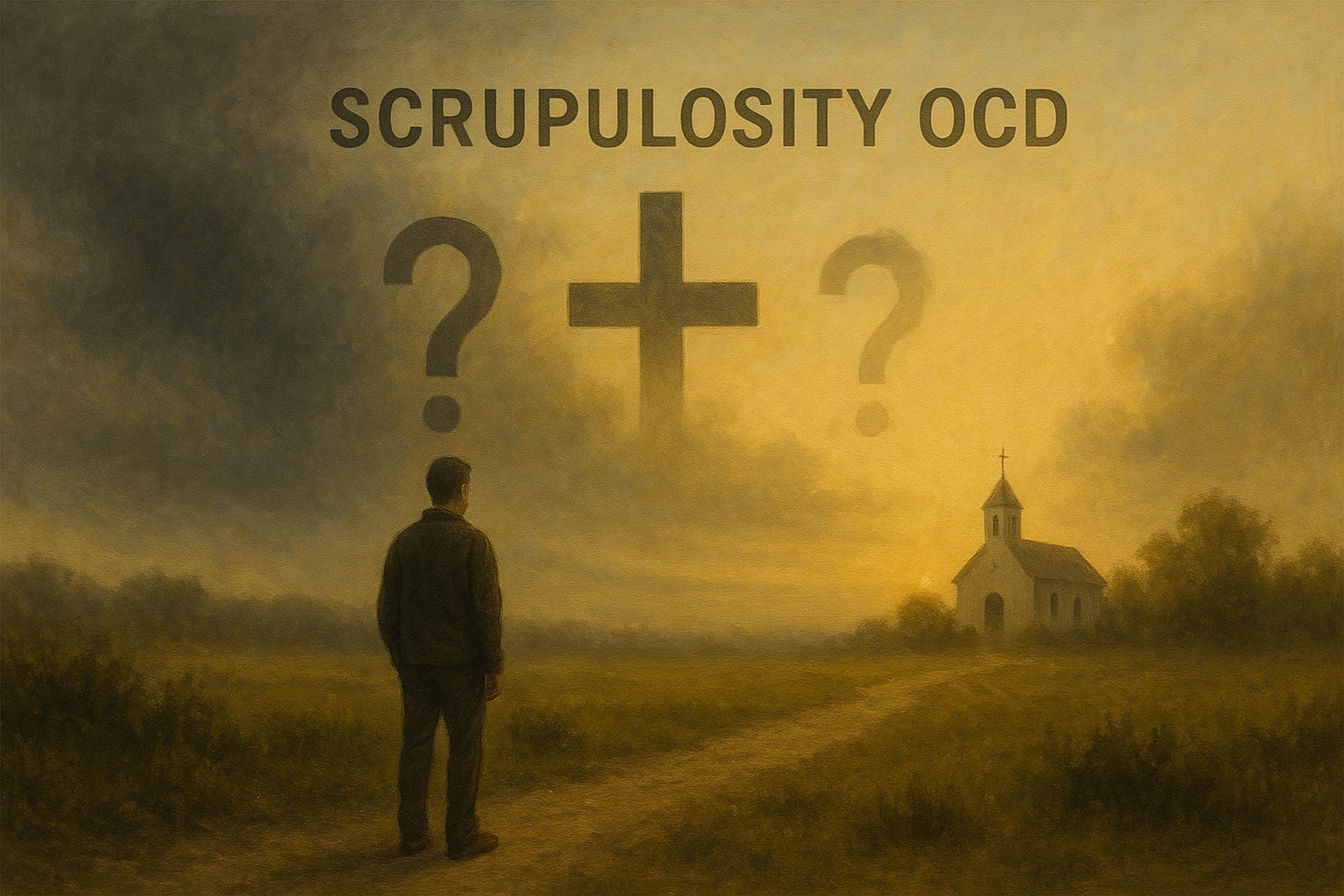Introduction
Scrupulosity OCD: Symptoms, Causes, Treatment, and Faith-Sensitive Recovery
Scrupulosity OCD is a form of obsessive–compulsive disorder centred on religious, moral, or ethical fears. Intrusive doubts about sin, purity, salvation, or “being a good person” trigger anxiety and lead to compulsions such as excessive prayer, repeated confession, mental neutralising, and reassurance-seeking. Although these behaviours may look devout, they are anxiety-driven attempts to gain certainty, which ultimately deepen the cycle of doubt and ritual.
Key idea: Genuine spiritual practice nourishes connection and values; compulsions are performed to relieve fear and achieve certainty.
Why Scrupulosity OCD Feels So Devastating
Because obsessions target core values and identity, people with scrupulosity often feel shame and powerlessness—believing the presence of a thought equals moral failure. Thought–action fusion (“thinking it is as bad as doing it”) and black-and-white morality make reassurance or logic insufficient, sustaining a relentless loop of doubt and ritualisation.
How It Manifests
- Intrusions: blasphemous phrases; sexual/violent images involving sacred figures; persistent fears of moral failure.
- Compulsions: repeated confession, ritualised prayers, excessive reading of scripture, avoidance of services/rituals, mental neutralising and checking (“did I intend sin?”).
- Consequences: hours lost to rituals, disrupted spiritual life, fatigue/insomnia, secrecy, and strained relationships.
Causes and Maintaining Factors
Psychological Factors
- Perfectionism, inflated responsibility, intolerance of uncertainty.
- Catastrophic moral interpretations; thought–action fusion.
Environmental & Cultural Factors
- Strict/punitive teachings; equating doubt with immorality; harsh moral judgment.
- Stressful life events (loss, illness) heightening vulnerability.
Note: Faith does not cause scrupulosity; the disorder co-opts one’s beliefs through anxiety and misinterpretation.
Treatment of Scrupulosity OCD
Effective, compassionate care respects beliefs while targeting compulsions and the demand for certainty.
Cognitive Behavioral Therapy (CBT)
- Reframes distorted beliefs (e.g., “a thought ≠ an act”).
- Challenges inflated responsibility and all-or-nothing morality.
- Builds tolerance for uncertainty about moral/spiritual states.
Exposure & Response Prevention (ERP)
- Gradual, collaborative exposures to feared thoughts/situations (e.g., reading triggering passages or attending services) while refraining from confession, reassurance, or mental neutralising.
- Faith-sensitive design ensures exposures target OCD, not genuine devotion.
Acceptance & Commitment Therapy (ACT)
- Views intrusions as transient mental events; practices cognitive defusion.
- Re-anchors life to values (compassion, service, family, faith) despite uncertainty.
Wellness Coaching
- Restorative routines: sleep, movement, nutrition, mindful prayer that is nurturing rather than compulsive.
- Schedules for community worship/service that reinforce connection over checking.
Personality Dynamics Course Correction
- Balances high standards with self-compassion and realistic expectations.
- Explores origins of rigidity (family messages, cultural pressures) and builds flexibility.
Healthy Coping Mechanisms
- Grounding, brief mindfulness, “worry time,” values-based actions during spikes.
- Accountability support that avoids feeding reassurance loops.
Emotional Health & Relapse Prevention
- Group/faith-sensitive support reduces shame and isolation.
- Plans for setbacks, with clear steps to resume ERP/ACT tools.
Success Stories
Ryan’s Recovery (Age 26, Bangalore)
Ryan feared he had blasphemed in thought and spent hours confessing. With faith-sensitive CBT and ERP, he practised attending services without repeated confession and learned to let intrusive phrases pass without neutralising. ACT helped him recommit to values of service and kindness. Over months, rituals shrank from hours to minutes, sleep returned, and spiritual life felt grounded rather than fear-driven.
Asha’s Transformation (Age 32, Delhi)
Asha avoided prayer, fearing “impure intentions.” Therapy disentangled devotion from compulsion. In ERP, she resumed brief, intentional prayers and resisted mental checks until they “felt right.” Wellness coaching restored balance; personality work softened perfectionism. Asha describes her faith now as “quiet, steady, and connected,” not dominated by doubt.
Frequently Asked Questions
How is Scrupulosity OCD different from strong faith?
Can prayer and religious practices trigger Scrupulosity OCD?
Does having Scrupulosity OCD mean I lack faith?
Can Scrupulosity OCD go away on its own?
How can families support someone with Scrupulosity OCD?
Conclusion
Scrupulosity OCD is treatable. A respectful, evidence-based plan—CBT and ERP enhanced by ACT, wellness routines, personality-dynamics work, and healthy coping—restores agency and genuine spiritual connection. The goal isn’t perfect inner certainty; it’s living your values with compassion, allowing thoughts to come and go, and letting faith be a source of meaning rather than fear.


